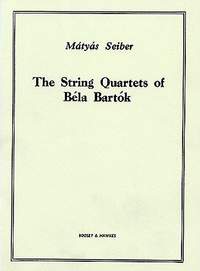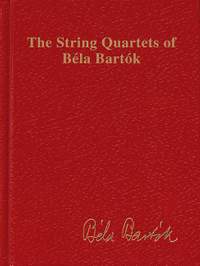9.30 Building a Library
Kate Molleson chooses her favourite recording of Béla Bartók’s String Quartet No. 5.
Throughout his career Bartók was obsessed with folk music, attracted by the invigorating irregularity its rhythms, its modes, often so contrary to conventional scale patterns, its unorthodox harmonic inflections and deep-rooted connection to landscape and people. He spent 40 years of his life collecting, transcribing and studying the indigenous music of central Europe, including his native Hungary.
By the time of the First World War, folk music pervasively and profoundly informed Bartók’s own music and its nevertheless uncompromising modernist style and rigorous formal organisation. By 1934, the year he wrote his fifth and penultimate string quartet, Bartók’s musical style had become more approachable and this wonderful work, at once playful and profound, so full of humanity and packing a huge emotional punch, is among the great string quartets of any century.
Available versions:-
Aeolus Quartet *
Alban Berg Quartet
Alexander String Quartet *
Arcadia String Quartet
Arcanto Quartet *
Belcea Quartet *
Budapest Quartet *
Chiara String Quartet *
Emerson String Quartet
Engegard Quartet *
Euclid Quartet *
Fine Arts Quartet
Guarneri Quartet
Hagen Quartet
Heath Quartet *
Hungarian String Quartet
Jerusalem Quartet
Juilliard String Quartet *
Lindsay String Quartet *
Meta4
Mikrokosmos String Quartet *
Novak Quartett
Parker String Quartet
Pro Arte Quartet
Quatuor Diotima
Erwin Ramor, Andreas Sándor, Zoltan Thirring, Vera Nogrady *
Rubin Quartet *
Takács Quartet *
Talich Quartett
Tatrai Quartet *
Tokyo String Quartet
Vegh-Quartet
Vermeer Quartet
Vertavo String Quartet
Zehetmair Quartet *
(* download only)
Kate Molleson chooses her favourite recording of Béla Bartók’s String Quartet No. 5.
Throughout his career Bartók was obsessed with folk music, attracted by the invigorating irregularity its rhythms, its modes, often so contrary to conventional scale patterns, its unorthodox harmonic inflections and deep-rooted connection to landscape and people. He spent 40 years of his life collecting, transcribing and studying the indigenous music of central Europe, including his native Hungary.
By the time of the First World War, folk music pervasively and profoundly informed Bartók’s own music and its nevertheless uncompromising modernist style and rigorous formal organisation. By 1934, the year he wrote his fifth and penultimate string quartet, Bartók’s musical style had become more approachable and this wonderful work, at once playful and profound, so full of humanity and packing a huge emotional punch, is among the great string quartets of any century.
Available versions:-
Aeolus Quartet *
Alban Berg Quartet
Alexander String Quartet *
Arcadia String Quartet
Arcanto Quartet *
Belcea Quartet *
Budapest Quartet *
Chiara String Quartet *
Emerson String Quartet
Engegard Quartet *
Euclid Quartet *
Fine Arts Quartet
Guarneri Quartet
Hagen Quartet
Heath Quartet *
Hungarian String Quartet
Jerusalem Quartet
Juilliard String Quartet *
Lindsay String Quartet *
Meta4
Mikrokosmos String Quartet *
Novak Quartett
Parker String Quartet
Pro Arte Quartet
Quatuor Diotima
Erwin Ramor, Andreas Sándor, Zoltan Thirring, Vera Nogrady *
Rubin Quartet *
Takács Quartet *
Talich Quartett
Tatrai Quartet *
Tokyo String Quartet
Vegh-Quartet
Vermeer Quartet
Vertavo String Quartet
Zehetmair Quartet *
(* download only)





Comment